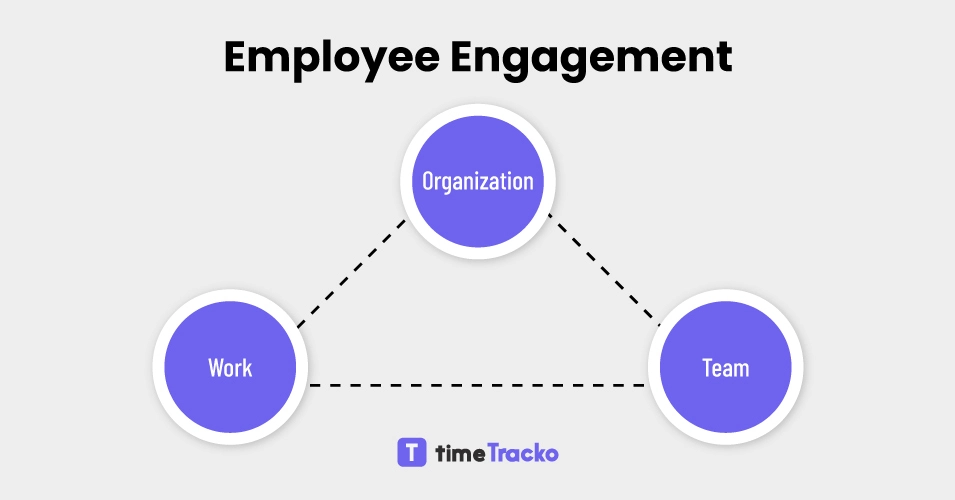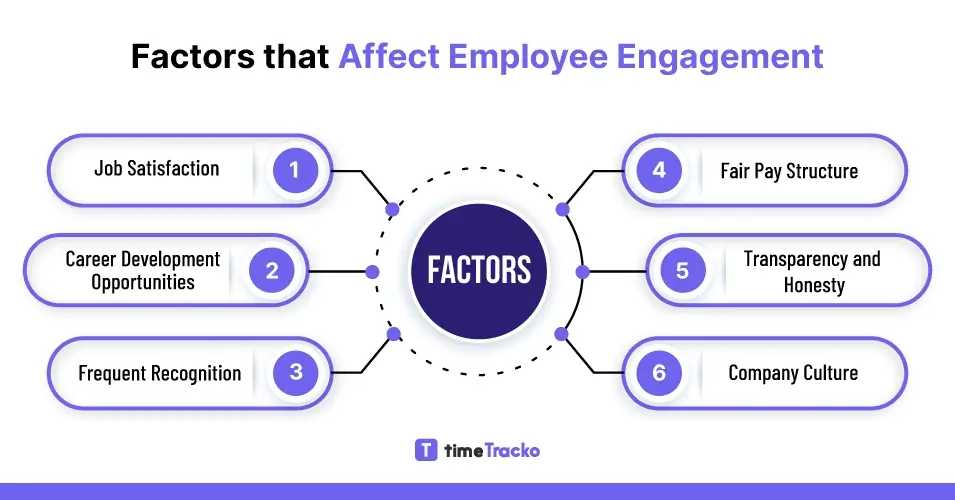What is Employee Engagement? 6 Best Factors of Employee Engagement
What is Employee Engagement? 6 Best Factors of Employee Engagement
“Employee engagement is the emotional commitment the employee has to the organization and its goals.” – Kevin Kruse
Engaged employees are those who feel a sense of commitment to their work.
Research shows that organizations believe satisfied employees drive business results, boost performance, and perform better.
Employee engagement can majorly impact the workforce, including productivity, profitability, customer satisfaction, employee absenteeism, and employee satisfaction. The engagement of employees is extremely important for large companies today since low engagement can negatively affect the business.
Less engaged employees are not emotionally attached to the company they work for. Moreover, they are dissatisfied with their role or the company where they work, do not show energy or passion, and procrastinate work throughout the day.
Disengaged employees can be destructive to your business — but if you understand what factors influence employee engagement, you can implement steps to improve things.
If you are wondering why employee engagement is crucial and what are the factors affecting employee engagement. Read the blog thoroughly to know more about it.
Must Read: Check out these practices for increasing productivity at work
What is Employee Engagement?
Employee engagement is an employee’s commitment to put within the organization for positive outcomes. Employee engagement is an individual’s involvement with proper time management and satisfaction at work.

According to Gallup’s research, 13% of employees worldwide and 35% of U.S. employees are “engaged” and 63% of employees are not engaged at their work.
The engagement of employees is among the most essential components in the success of an organization since it creates strategies for better work culture, increases productivity, promotes better customer relations, and reduces staff turnover.
An employee who is deeply committed to the organization works harder, stays longer, and motivates their colleagues.
Must Read: You’re doing it wrong – Do this to motivate your team instead
What Does an Engaged Employee Look Like?
Employees who are deeply engaged are more concerned about their work and business, are committed to business missions, and goals, and look to improve their performance through their roles. Deeply engaged employees exhibit the following characteristics.
- Enthusiastic about their work
- Focused and emotionally committed to their organization
- Look for opportunities to learn and grow
- Engaged employees are responsible and reliable
- They value their role and contribute to company success
- They value and understand company goals, missions, and objectives
What are The Factors that Affect Employee Engagement?
Highly engaged employees bring their best effort in everything they do in their workplace. Engaged employees are key to a successful business because they affect every aspect of a business.

The most important factors that affect employee engagement in an organization are listed below:
1. Job Satisfaction
Job satisfaction is the essential factor for employee engagement associated with employee sentiments. When employees are more satisfied with their jobs, they are more likely to get involved as well.
Also, we can say employee satisfaction relates to how satisfied and happy employees are with
- Team members, managers, and the company itself.
- Work environment
- Compensation and benefits
- Job impact on personal life
Thus employee satisfaction needs to be treated with a long-term vision. It is more destructive when an employee is unsatisfied but continues to work within an organization, and productivity and engagement suffer.
A dissatisfied employee usually lacks motivation, engages poorly, performs poorly, and displays negative attitudes, which can negatively affect a company.
Factors Determining Job Satisfaction
The following are factors that influence employee satisfaction with jobs in the current market.
- Does your company care about its employees?
- Do their colleagues respect employees?
- Does your company have fair and inclusive policies?
- How secure do employees feel in their jobs?
- Is there a culture of two-way effective feedback?
- Are promotions given to the best employees?
- Are there any career development opportunities?
Benefits of Job Satisfaction
Increasing job satisfaction makes greater business sense.
- Employee productivity can be boosted
- Reduce employee absenteeism
- Increases employee retention
- Contribute positive results toward employee referral programs
- Increase bottom line profits
- An engaged employee offers better customer service.
2. Career Development Opportunities
When employees get career development opportunities, they are likely to get more focused on their job, resulting in business benefits in several ways. Employees are likely to perform at a higher level.
Additionally, modern workers are increasingly bored with their jobs, leading them to seek other employment options. Offering career development opportunities is one of the alternatives to this.
- Providing career counseling advice
- Offering mentorship to team members
- Providing internal promotions
- Skill advancement certifications
- Self-awareness training
- Industry conference
Research said that investing in employee career development like giving training and professional development was one of the most effective employee engagement ideas.
Benefits of Career Development Opportunities
Organizations and employees can both benefit from career development opportunities as follows:
- Employee retention
- Employee engagement
- It reduces employee turnover by providing increased promotional avenues
- It improves employee morale and motivation
3. Frequent Recognition
“Employee engagement is largely driven by recognition.”
Employee recognition could be considered the most important employee engagement success factor.
The importance of frequent recognition cannot be emphasized. When employees are recognized,
- They feel more committed to the organization, perform better, and increase the likelihood to stay.
- They feel pride and are ready to work just as hard on their next project.
- Recognition not only enhances employee engagement but has also enhanced performance and loyalty to the organization, resulting in higher retention.
Your company could not exist without the work that employees do every day. It’s especially important that managers and leaders give recognition as it has been demonstrated to be a powerful form of encouragement and employee engagement.
Benefits of Frequent Recognition
When companies show appreciation to employees on a regular basis, they’re 41% more likely to see higher retention and 34% more likely to see higher engagement.
- Increased productivity and engagement
- Reduction in the turnover of employees
- Increased employee satisfaction and enjoyment of work
- Decreased stress and absenteeism
- Higher loyalty and satisfaction scores from customers
Must Read: Are you looking for ways to reward your employees? Take a look here for some ideas
4. Fair Pay structure
We all know that salaries are sensitive topics to discuss, and it is something that will always come up. Explain how the company’s pay structure works and what they look for when deciding whether a certain employee deserves a promotion.
When you become transparent and educate your employees, they will be able to understand your expectations more clearly and even work harder to prove to you that they deserve to be promoted.
Benefits of Fair Pay Structure
- The right compensation can motivate your workers to give their best, which keeps them engaged and encourages them to do more.
- Furthermore, it results in higher employee retention and lower turnover rates by increasing happiness and job satisfaction.
5. Transparency and Honesty
Rumors and gossip don’t appeal to anyone.
Having an honest work environment contributes to employee engagement, where employees feel they can talk openly about anything that is bothering them.
An organization’s lacking transparency and honesty negatively impacts the following aspects:
- Employee performance and productivity
- Retention
- Employee engagement
- Information could be misunderstood
- No trust exists
- Miscommunication
- Loyalty between team members
- Identification with the company lacks.
Benefits of Transparency and Honesty
- Encourage communication and sharing
- Better employee engagement and happiness
- Improved employee performance
- Collaboration and a stronger understanding of other people and other aspects of an organization.
Must Read: Having trouble keeping the workplace healthy? Here are some tips you shouldn’t miss!
6. Company Culture
Company culture has a direct impact on employee engagement. Employees clearly understand their responsibilities and what they are working on.
The engagement of employees is intrinsically linked to company culture. To increase employee engagement, improve your company’s culture.
Organization culture can affect employee engagement in several ways:
- Employee engagement is more likely to be enhanced by a company culture that is energetic, and positive than that is unpleasant and negative.
- An employee will be more engaged when they fit the company culture.
- Certain characteristics such as rewarding and recognizing outstanding performance might help to boost productivity and engagement.
Employees will be more likely to be inclined to a culture that is vibrant, enthusiastic, and friendly.
Benefits of Good Company Culture
Some of the benefits of having strong company culture are:
- Positive workplace cultures boost teamwork, employee morale, productivity, and retention.
- Work satisfaction, teamwork, productivity, and work performance are all enhanced.
Must Read: Trying to adapt to new workplace culture? Here are some of the best practices for doing so
Conclusion
Growth and profitability are driven by employee engagement and satisfaction.
By promoting a company culture that nurtures and retains talent, you improve your employees and your client’s satisfaction and public perception of your company.
Keep your company on the path to success and your employees happy by taking immediate action.

 in Melbourne
in Melbourne 
 Employee Screen Monitoring Software
Employee Screen Monitoring Software App and Website Monitoring Software
App and Website Monitoring Software Time and Attendance Software
Time and Attendance Software Finance
Finance Banking
Banking Healthcare
Healthcare Lawyers
Lawyers Retail & ecommerce
Retail & ecommerce Knowledge base
Knowledge base Blogs
Blogs Installation Guide
Installation Guide FAQs
FAQs About
About Media Kit
Media Kit Contact us
Contact us